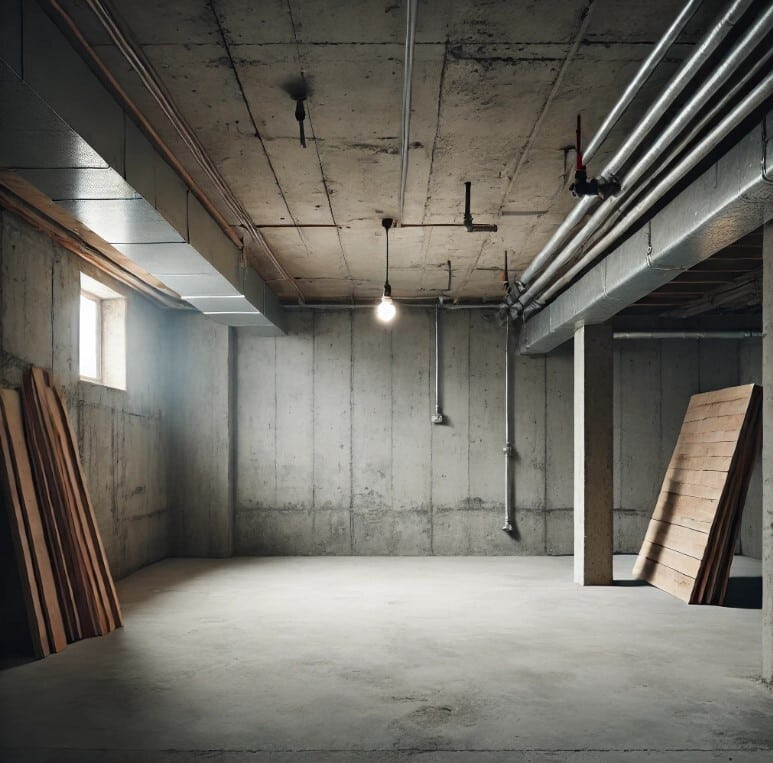Does Not Having a Basement Decrease Home Value?
Just as an artist values the untouched canvas, full of potential and possibility, you, as a homeowner or potential buyer, may see a home without a basement in a similar light. You might consider the lack of a basement as an opportunity for lower maintenance costs and fewer worries about potential flooding issues. On the other hand, it could also be viewed as wasted potential for additional living space or storage.
Such considerations can influence a home’s value, but is there a definitive answer to whether not having a basement decreases a home’s worth? To answer this question, we must explore the various factors that contribute to a home’s overall value and how a basement, or lack thereof, can sway this delicate balance.
Stay with me, as we navigate the labyrinth of real estate value assessment together.
Key Takeaways
- Basements generally increase home value by providing additional square footage.
- The condition and quality of a basement can significantly impact the overall value of the home.
- In regions prone to flooding, homes without basements may hold their value better.
- Preferences for homes with or without basements vary by region and market trends.
Understanding Home Value Factors
Grasping the multitude of factors that influence your home’s value can feel like unraveling a complex tapestry, but it’s key to understanding how features like basements impact the overall price. You may think the size and location of your home are the primary factors, and you’re not wrong. However, it’s more intricate than that.
Numerous elements come into play – interior and exterior renovations, the age and condition of your home, neighborhood appeal, and even something less tangible like market trends. All these aspects contribute to your home’s worth in the real estate market. For instance, a newly renovated kitchen or a landscaped yard can significantly increase your home’s value. Conversely, outdated features or a deteriorated roof could decrease it.
Now, when considering a basement’s impact on home value, you must understand that its influence varies. In some regions, a basement may be a standard expectation, thereby affecting the price if it’s non-existent. In contrast, in areas where basements aren’t common, not having one probably won’t affect your home’s value. It’s all about understanding these nuances to fully grasp how home value works.
Basements and Real Estate Market Trends
When it comes to understanding the impact of basements on home value, it’s crucial to consider current real estate market trends. They can provide insights into buyer preferences, regional variations, and the perceived value of basements in different market conditions.
Consider these market trends:
- An increasing number of buyers prefer open floor plans, and a basement can offer this additional living space.
- In some regions, particularly those prone to flooding or with high water tables, basements aren’t desirable due to potential water damage.
- Basements are highly valued in areas with cold climates as they provide additional insulation.
- The trend toward remote work and homeschooling has increased demand for homes with extra rooms, such as basements, to use as offices or classrooms.
- The market trend toward multigenerational living also increases the value of basements, which can serve as separate living spaces.
As a homeowner, you should be aware of these trends, which can significantly influence a home’s value. Whether or not a basement adds value to your home largely depends on these real estate market trends and regional preferences.
The Impact of a Basement on Home Pricing
Understanding these market trends and regional preferences, let’s now examine how the presence or absence of a basement directly influences a home’s pricing.
Firstly, it’s important to remember that a basement effectively increases the square footage of your home. More space typically correlates with a higher asking price, as buyers often perceive value in terms of size. So, if you’ve got a finished basement that’s up to code, you’re likely looking at a significant bump in your home’s value.
However, it’s not as simple as ‘more space equals more money.’ The quality of the basement matters immensely. A poorly maintained, dank basement may, in fact, detract from your home’s value as potential buyers factor in the cost of renovations or worry about issues like dampness and mold.
Pros and Cons of Homes Without Basements
Shifting our focus to homes without basements, it’s essential to weigh the advantages and disadvantages this can present in terms of property valuation.
For starters, lack of a basement can mean lower construction and maintenance costs. This can be an attractive feature for buyers looking for a cost-efficient home. However, it also means less space, which could be a deal breaker for families or individuals seeking a spacious property.
Let’s delve deeper into the pros and cons:
- Lower construction and upkeep costs: Without a basement, building and maintaining a home can be cheaper.
- Energy Efficiency: Homes without basements can be more energy efficient as they typically have less square footage to heat or cool.
- Fewer moisture problems: No basement equals less risk of flooding or moisture-related issues.
- Limited space: The absence of a basement reduces the total living or storage space.
- Resale considerations: Some buyers may perceive a home without a basement as less valuable, potentially impacting resale value.
Thus, while a lack of basement can offer certain benefits, it also has its drawbacks. It’s important to consider these factors when determining a home’s value.
Case Studies: Basement Vs. No Basement
To truly grasp the impact of a basement (or lack thereof) on a home’s value, let’s dive into some real-world case studies comparing homes with and without basements.
In a 2019 study by Zillow, homes with basements were found to generally sell for more than those without. The price difference varied by region, with homes in the Midwest seeing the greatest increase in value. However, it’s not just about the presence of a basement, but also its condition and usability. A finished, well-maintained basement can add significantly more value than an unfinished or poorly kept one.
But, there’s a flip side. A case study in California, where basements are less common due to seismic activity, showed that homes without basements don’t necessarily suffer in value. In fact, many buyers in these areas prefer homes without basements due to lower maintenance and potential for damage.
Frequently Asked Questions
How Does the Presence of a Basement Affect a Home’s Energy Efficiency?
A basement can greatly impact your home’s energy efficiency. It provides natural insulation, reducing the need for artificial heating in winter and cooling in summer.
However, poorly insulated basements can lead to energy loss. So, it’s not just about having a basement, but its condition too.
If it’s well-insulated and properly maintained, it can indeed enhance your home’s energy efficiency, saving you on energy costs in the long run.
Are There Any Legal Regulations or Constraints Related to Having or Not Having a Basement in a Home?
In the world of housing regulations, rules can change as often as the tide. While there aren’t any universal laws saying you must have a basement, local codes and regulations can vary greatly.
It’s essential you research your area’s specific rules before building or buying a home. Some places might necessitate a basement for structural reasons, others may prohibit them due to high water tables or seismic activity.
Be diligent, it’s a veritable minefield out there!
How Does the Absence of a Basement Impact the Overall Design and Layout of a Home?
Without a basement, you’ll have to rethink your home’s layout. You’ll miss out on extra storage or living space, which could necessitate a more efficient design elsewhere.
It might affect where you place utilities normally housed in basements. This could limit your design flexibility. But, it’s not impossible.
You can still create a functional, spacious home. It just requires thoughtful planning and smart use of your available space.
Are There Any Insurance Implications for Homes Without Basements?
In the insurance realm, you’re not necessarily penalized for lacking a basement. However, without a basement, you might see higher rates for flood insurance, as basements often provide an extra layer of protection against water damage.
But don’t let this throw you for a loop, it’s all part of the home insurance puzzle. Each home’s unique features contribute to the final insurance cost, so it’s crucial to weigh these factors when purchasing a home.
What Are Some Alternative Spaces a Homeowner Can Utilize if the House Does Not Have a Basement?
If you’re lacking a basement, don’t fret! There are plenty of alternative spaces you can use.
Your garage can serve as a storage or workshop area. An attic could be transformed into a cozy living space or a quiet office. You can also convert a spare room into a home gym or hobby room.
Even your backyard shed can be utilized for storage or a charming retreat. It’s all about maximizing what you’ve got!
Conclusion
In the grand scheme of real estate, a basement isn’t always the ace up your sleeve. While it can add value, it’s not a deal breaker if you don’t have one. Like a book, a home’s worth isn’t defined by one chapter alone.
Market trends, location, and overall condition are major players in your home’s story. So, no basement? No problem. Your home’s value is far from being on shaky ground.



